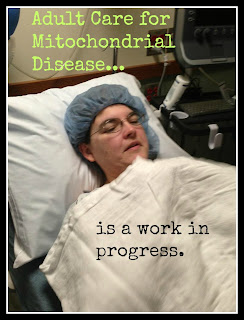If you are a pediatric patient that is transitioning from your children specialist ask their opinion. Have your pediatric specialist call ahead and talk with the new doctor. Be sure to have all medical records transferred to your new doctors. I highly recommend you get copies for yourself as well. That way you have a hard copy in YOUR hands in case it is needed in the future.
You are a parent of a child diagnosed with mitochondrial disease. Suddenly all those odd medical problems make sense. The picture of a life time of infections, moments of extreme exhaustion, or muscle weakness, etc make sense. It can take your breath away to have answers. It can also be incredibly daunting to realize you have mito as well as your child.
You were doing fine until you began losing your vision, hearing, an infection left you with extreme weakness, a stroke... so many ways to get here but it feels like one day you were an adult working, and making a life then suddenly you became a person with a progressive disease. You feel sick and it has become so hard to keep your life balanced.
You are in charge of your care!
Finding a Primary Care Physician (PCP) is the first step. Then work your way out from there.
Getting a team of medical professionals that is willing to talk to each other is key. I always look for a specialist that is willing to be educated about mito and the newest tests, or how this disease affects me specifically. When you have a team that is willing to listen and learn from one another you can get high quality care in a timely manner.
For adults this may mean you have to go to several centers of excellence like Cleveland Clinic, Mayo Clinic, or NIH then have those 'super' specialists direct your local specialist. How does this work in real life??
I live in West Virginia. Just far enough away from Pittsburgh, Cleveland Clinic, or NIH to use them for acute and ongoing care. What I can do is go once a year for a couple of days of intense testing and LOTS of appointments. Then get reports from those 'super' specialists used to dealing with mitochondrial disease. I make sure the specialist writes recommendations that are for ME and MY condition. Then I able to show my local drs the reports. I also strongly encourage my local doctors to call the 'super' specialists when the reports come in rather than wait until I have an acute issue.
Even with all that preparation adult health care for mitochondrial disease patients is a work in progress. This week, Mitochondrial Disease Awareness Week is a HUGE step forward!

No comments:
Post a Comment